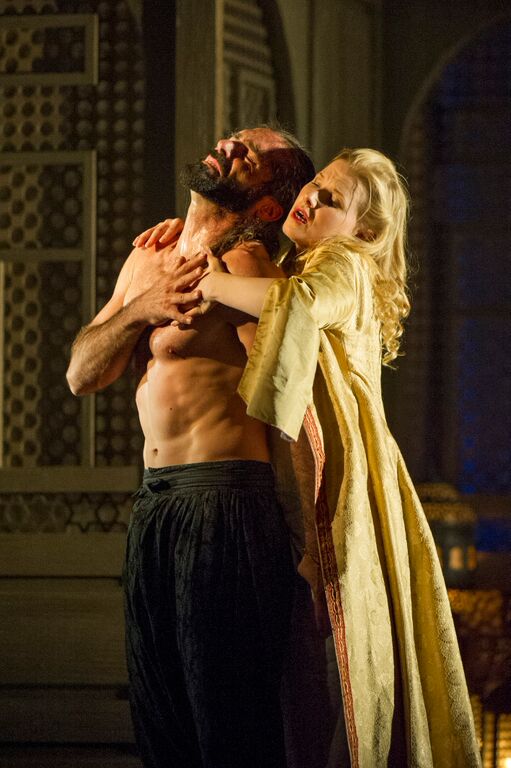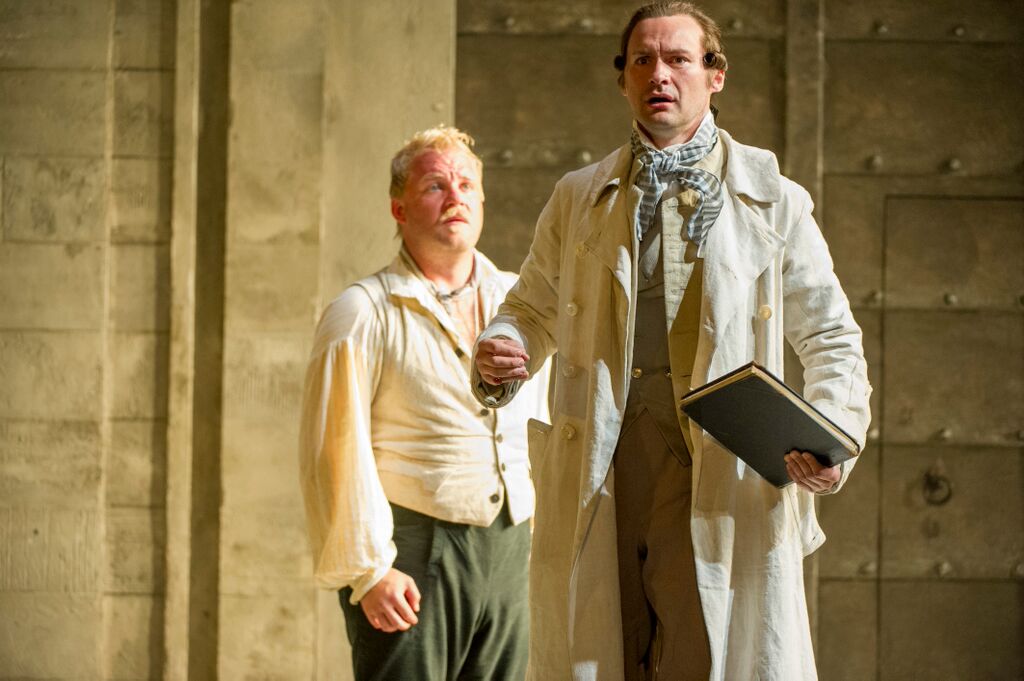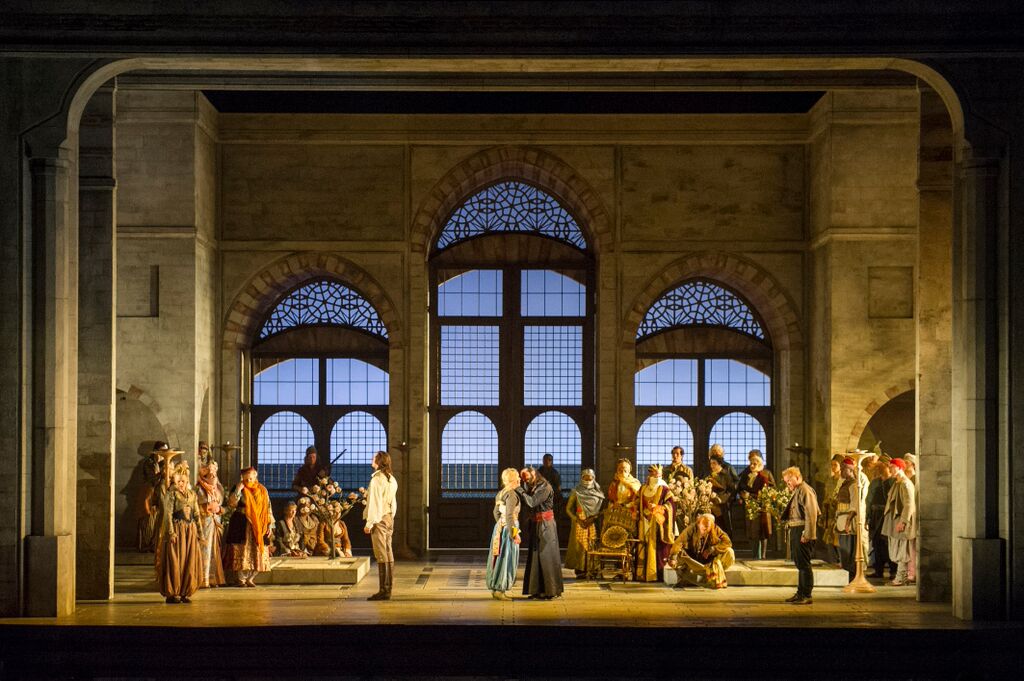What a difference seven years can make to a budding genius. Mozart’s La finta giardiniera (1775) has only patches of brilliance, and last year’s Glyndebourne production, despite musical excellence, failed them all. This time an experienced director on best form, David McVicar, finds more nuanced humanity in the composer’s first mature German drama, Die Entführung aus dem Serail (The Abduction from the Seraglio, 1782) than I’d have believed possible, mirrored in the light and fire of Glyndebourne Music Director Robin Ticciati and the Orchestra of the Age of Enlightenment. If you think Mozart’s orientalist rescue opera is stocked full of clichés, this is a deeply-felt show to make you think differently.
Not that McVicar does anything radical – or perhaps it is, perversely, radical, to set the whole thing as envisaged in the court of a western-influenced 18th century pasha whose passions are architecture and gardening. The east-meets-west complexities are pointed up by the way in which hero Belmonte, despondent by a sparkling sea at the start, is beset by local hawkers and traders, only for the Ottoman potentate to be similarly petitioned by sellers of European landscapes and busts. It’s a nice touch, too, that we see an onstage cello as part of a seraglio string quartet while from the wings OAE woodwind play the sublime slow movement from Mozart’s B flat major Serenade, composed not long before Entführung.
 The names of designers Vicki Mortimer (sets and costumes) and Paule Constable (lighting) guarantee an atmospheric and malleable evocation. What a beautiful sight are enslaved Pedrillo’s and tyrannical servant Osmin’s little seraglio gardens, and what a shock it is to us horticulturalists when Osmin starts digging up and chopping about his hated western competitor’s efforts. In the first of many animated set-pieces, Tobias Kehrer sets the seal on a voice which the minute he’s opened his mouth from behind the palace windows we note with satisfaction is a true basso profundo.
The names of designers Vicki Mortimer (sets and costumes) and Paule Constable (lighting) guarantee an atmospheric and malleable evocation. What a beautiful sight are enslaved Pedrillo’s and tyrannical servant Osmin’s little seraglio gardens, and what a shock it is to us horticulturalists when Osmin starts digging up and chopping about his hated western competitor’s efforts. In the first of many animated set-pieces, Tobias Kehrer sets the seal on a voice which the minute he’s opened his mouth from behind the palace windows we note with satisfaction is a true basso profundo.
Kehrer, playing Osmin as wild man of the woods rather than calcularting sadist, is the vocal star – and since McVicar’s production goes for realism, then you could also argue that a gingerish-haired Turkish overseer could be a Laz from the Black Sea coast. Or maybe Pasha Selim brought him along from Europe en route for Turkey after the hero’s father dispossessed him in Oran (a back history revealed only towards the enlightened end of the opera). With so much more dialogue than we usually get, non-singing role Selim’s split between an urge to violent possession and a nobler renunciation comes across strongly. Franck Saurel (pictured above with Sally Matthews's Konstanze) sounded a little hoarse last night, but his charisma ensures that the scenes with Konstanze, the western woman he seems truly to love, fire at every moment.
His presence also gives Sally Matthews something to react to in her enormous bravura aria “Martern aller arten”, every run and top note perfectly in place as they are throughout. Matthews’s technique, as has often been noted, is curious – slightly backward in placement, not always clear with the words and with a vibrato which, like that of her Belmonte (Edgaras Montvidas), sometimes stops a real Mozartian line from flowing. But the upper-register brilliance and stage presence make amends.
 Matthews and Montvidas - convincing as a handsome, haughty Spanish aristocrat (pictured left with Brenden Gunnell's Belmonte), an Almaviva in the making - are best together when, after a failed escape attempt, the lovers find themselves at Selim’s mercy. How is it that I’d remembered the Act Two Quartet as the last great number in the piece and thought there wasn't much to anticipate after the long supper interval when here, just before the reconciliation, is a duet which anticipates the love that transcends death in The Magic Flute? There are similar Masonic/universal sentiments which can still surprise when they're underlined as well as they are here (though Mozart didn’t join the fraternity until 1784, two years after Entführung’s premiere). McVicar gives these final stages (pictured below) such intensity that Mozart becomes the Shakespeare of Much Ado About Nothing’s potential tragedy.
Matthews and Montvidas - convincing as a handsome, haughty Spanish aristocrat (pictured left with Brenden Gunnell's Belmonte), an Almaviva in the making - are best together when, after a failed escape attempt, the lovers find themselves at Selim’s mercy. How is it that I’d remembered the Act Two Quartet as the last great number in the piece and thought there wasn't much to anticipate after the long supper interval when here, just before the reconciliation, is a duet which anticipates the love that transcends death in The Magic Flute? There are similar Masonic/universal sentiments which can still surprise when they're underlined as well as they are here (though Mozart didn’t join the fraternity until 1784, two years after Entführung’s premiere). McVicar gives these final stages (pictured below) such intensity that Mozart becomes the Shakespeare of Much Ado About Nothing’s potential tragedy.

Not that the comedy is muted. Brenden Gunnell pours disciplined vitality into Pedrillo’s numbers, but the tour de force is Blonde’s kitchen spat with Osmin that kicks off Act Two in style. Mari Eriksmoen plays the spirited Englishwoman to the hilt, and you sense real emotional possibilities in the plate-smashing, egg-chucking quarrel with Kehrer’s endlessly coarse – and crucially likeable – Osmin. Ticciati is especially good at energising his music, strings flaring up and down the scale when they’re not trilling with delight. And though the dramaturgy of Mozart’s collaboration with Christoph Friedrich Bretzner and the enlightened topper-and-tailer Johann Gottlieb Stephanie Junior proceeds in fits and starts, this excellent ensemble makes us realize that no number is weak or generic. Entführung may not usually be anyone’s favourite Mozart, but Glyndebourne’s vintage evening might just make it so, if only for the duration.















Add comment